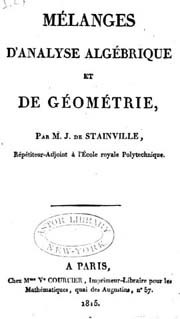Fourier's Proof that e Is Irrational
Janot de Stainville ascribes this proof to Joseph Fourier.[1] Start with:
e &= \sum_{n=0}^\infty{1 \over n!}\\
&= 1 + {1 \over 1!} + {1 \over 2!} + {1 \over 3!} + {1 \over 4!} + \cdots\\
&\lt 1 + 1 + {1 \over 2} + {1 \over 2^2} + {1 \over 2^3} + \cdots\\
&= 3.
\end{align*} \]
The reason for the inequality is that each factorial is greater than a product of as many twos as there are factors in the factorial, discounting the one; for example, \( 4! = 1 \cdot 2 \cdot 3 \cdot 4 \gt 1 \cdot 2 \cdot 2 \cdot 2 = 2^3. \) The final step results from summing the geometric series. It follows that \( 2 \lt e \lt 3 \) and in particular, that \( e \) is not a whole number.
We want to prove that \( e \) is irrational. Assume contrarily that \( e = p /q = \sum_{n=0}^\infty{1 / n!} \), where \( p \) and \( q \geq 2 \) are positive whole numbers. Multiply through by \( q! \):
\[ \begin{align*}
p \cdot (q-1)! &= q! \left(1 + {1 \over 1!} + {1 \over 2!} + \cdots + {1 \over q!} + {1 \over (q+1)!} + {1 \over (q+2)!} + {1 \over (q+3)!} + \cdots\right)\\
&= \underbrace{q! \left(1 + {1 \over 1!} + {1 \over 2!} + \cdots + {1 \over q!}\right)}_{\LARGE A} + \underbrace{q!\left({1 \over (q+1)!} + {1 \over (q+2)!} + {1 \over (q+3)!} + \cdots\right)}_{\LARGE B}.
\end{align*} \]
Each of the summands in \( A \) is an integer because \( q! \) cancels all the denominators; it follows that \( A \) itself is an integer. The left side of this equation is also an integer; consequently \( B \) must be an integer. But:
\[ \begin{align*}
B &= q!\left({1 \over (q+1)!} + {1 \over (q+2)!} + {1 \over (q+3)!} + \cdots\right)\\
&= {1 \over {q+1}} + {1 \over{(q+1)(q+2)}} + {1 \over{(q+1)(q+2)(q+3)}} + \cdots\\
&\leq {1 \over {q+1}} + {1 \over {(q+1)}^2} + {1 \over {(q+1)}^3} + \cdots\\
&\leq {1 \over 3} + {1 \over 3^2} + {1 \over 3^3} + \cdots\\
&= {1 \over 2}.
\end{align*} \]
So \( B \) is an integer with \( 0 \lt B \leq \frac{1}{2} \), which is impossible. Consequently the original assumption, that \( e \) is rational, is not tenable. QED.
Mike Bertrand
Madison, WI
Jan 28, 2018
^ 1. Mélanges d'analyse algébrique et de géométrie, by Janot de Stainville (Veuve Courcier, Paris, 1815).
